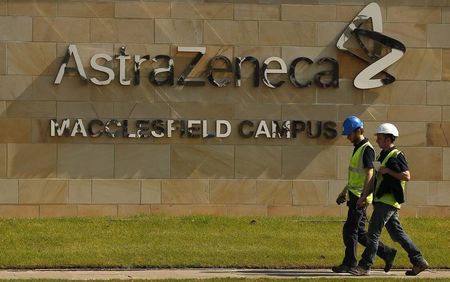By Ben Hirschler
LONDON (Reuters) - A vote by U.S. experts against accelerated approval of a new ovarian cancer drug from AstraZeneca (L:AZN) has dented its claims of research prowess, which were used to see off a $118 billion (69.31 billion pounds)bid from Pfizer (N:PFE).
In itself, the setback will have little impact on earnings prospects - but it coincides with heightened scrutiny of the British drugmaker's research and development (R&D) machine and continued talk that Pfizer may return if it stumbles.
Pfizer backed off last month after AstraZeneca trumpeted its drug pipeline and predicted sales would climb 75 percent to $45 billion by 2023 - a highly ambitious target.
But many shareholders are unhappy that the Anglo-Swedish group did not engage with Pfizer and problems with important new drugs may stir discontent.
The U.S. group could revive its plan later this year to forge the world's biggest drugmaker, in a move that would also cut its tax bill through moving its tax base to Britain.
The U.S. Food and Drug Administration's Oncologic Drugs Advisory Committee (ODAC) said on Wednesday that AstraZeneca should be required to submit further clinical data before its experimental medicine olaparib is approved.
"The rejection by ODAC comes at a critical time because failed R&D efforts may make AstraZeneca shareholders more inclined to push AstraZeneca into Pfizer's arms," said Bernstein analyst Tim Anderson. "Every bit of slippage at the company probably does tilt the balance slightly more in favour of a future Pfizer-AstraZeneca tie-up."
Anderson sees a less than 50 percent chance of either AstraZeneca inviting Pfizer back to talks or the U.S. company returning with a higher offer, but said the situation remained fluid. Other analysts are more upbeat on a deal.
BNP Paribas said in a research note this week that an increased offer of around $127 billion would still make economic sense, while Jefferies earlier this month predicted an 80 percent probability of AstraZeneca inviting Pfizer back after an enforced cooling-off period ends in late August.
DEAL HIATUS
Given the present hiatus, many hedge funds have switched attention away from AstraZeneca to the likes of AbbVie's (N:ABBV) attempt to buy Shire (L:SHP), industry sources said.
Other factors could also encourage or deter Pfizer's renewed interest, including any move by AstraZeneca to make a large acquisition of its own or dispose of certain drugs. The company has already said it is partnering talks for an experimental Alzheimer's medicine.
Cancer is the most valuable element in AstraZeneca's pipeline and earlier this month it received generally positive feedback when experimental findings with new treatments were presented at a major U.S. conference.
But the real test for new drugs is winning approval from regulators and getting prescriptions written by doctors.
AstraZeneca said it was disappointed by the ODAC decision, which means it is likely to have to wait for further clinical trial data due at the end of 2015, rather than getting a hoped-for green light in October.
Seamus Fernandez, an analyst at Leerink, said the decision was a surprise and would substantially narrow AstraZeneca's lead over smaller rivals Tesaro (O:TSRO) and Clovis (O:CLVS), which are also developing similar so-called PARP inhibitor drugs.
AstraZeneca has flagged olaparib as a potential $2 billion-a-year seller, although some industry analysts see sales at less than half that amount.

A company spokeswoman said the monotherapy use of olaparib for ovarian cancer assessed by the U.S. expert panel this week was only one element of a broad development programme.
AstraZeneca is also assessing olaparib in combination with another medicine called cediranib, as well as looking at it as a potential therapy for breast and gastric cancers.
(editing by David Stamp)
